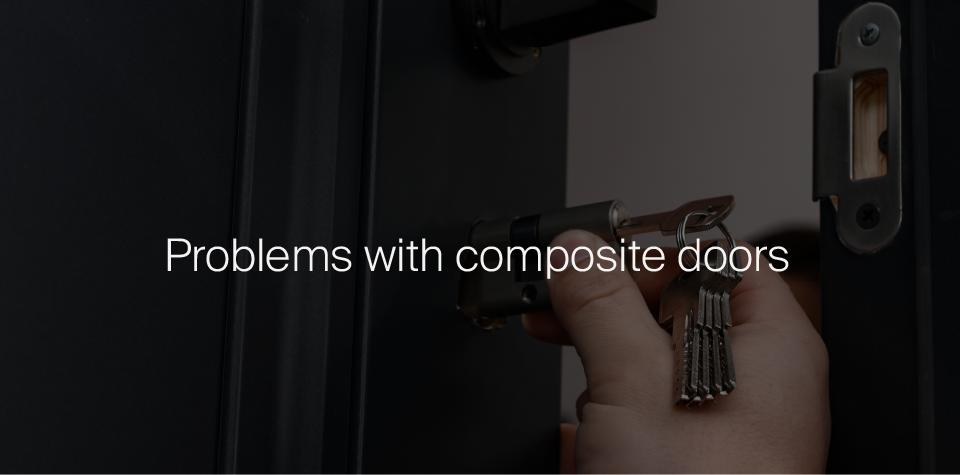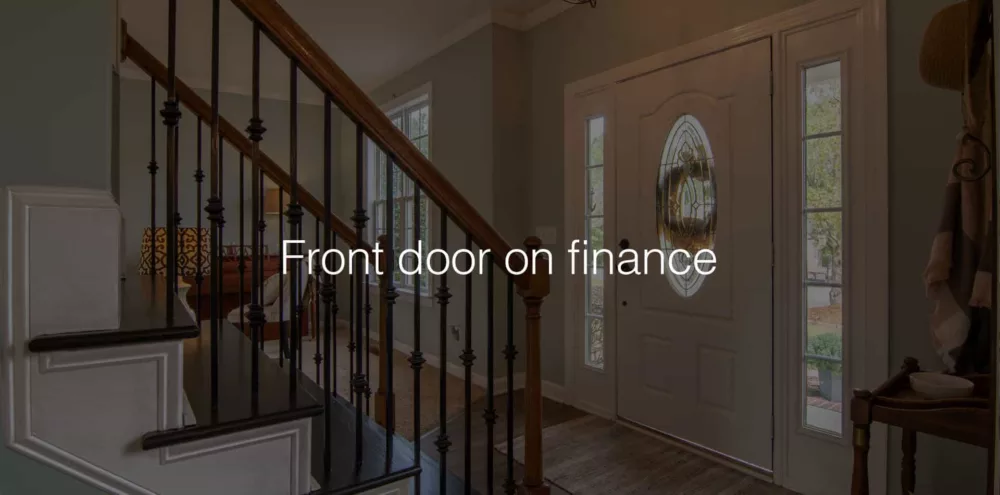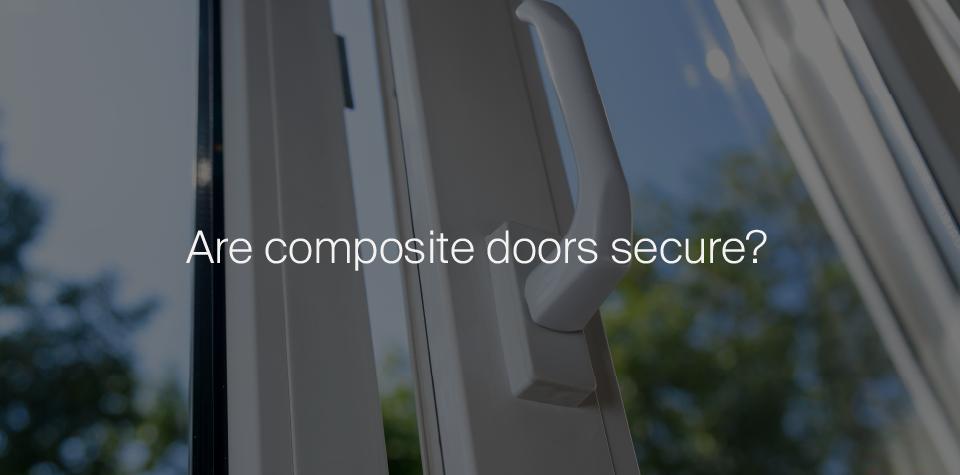Problems With Composite Doors and How to Fix
Composite doors are fantastic. They have been specifically designed to be highly secure, easy to maintain, and have great thermal efficiency.
However, nothing lasts forever, and things do tend to fall apart from time to time - even the sturdiest composite products.
Your composite door may be (nearly) perfect, but it may have some or other problem in its lifetime. Unfortunately, composite doors are not invincible and can experience some common problems, so it is best to be aware of them.
We will get you clued up on all you need to know about all of the most common problems with composite doors that we know about.
Design and order your new door online, with finance at checkout:
Common Composite Door Problems
It is not very often that your composite door will experience any issues. "Problem" isn't exactly a word in the world of composite doors, but difficulties do happen on the odd occasion, and it is best to be aware of these problems (dare we say it) and know how to fix them.
There is a slight chance that you may experience some of the following common composite door issues:
- Sticky locking mechanism
- Door staining
- Door swelling
- Draughts
- Worn seals, worn gaskets
- Composite door hinge dropping
- Blocked drainage slots/holes
- Fading
- The door won't shut
Now that we've named some of the common composite door problems, let us see how to spot them and what to do.
Sticky lock
Although composite doors are simple to maintain, you shouldn't put off routine maintenance. After all, you always want your door to look its best - just like a brand-new composite door. For other composite door-locking mechanism problems, you'll be able to find more details on our door-locking problems advice page.
Sticky locks can compromise home security and are sometimes incredibly unpleasant and irritating. You may prevent this frequent issue and lengthen the lifespan of your composite door locks by doing some basic maintenance.
WD-40 is a popular option for lubricating your door lock, but it may have more negative effects than positive ones when dealing with composite door lock problems.
Never use oil- or grease-based lubricants on your door cylinder. Use a lubricant that is silicone or graphite-based instead on your locking cylinder to avoid damaging it, so your door lock will be fit for use for years to come.
The door staining
Staining results from the natural wear and tear that composite doors experience over time. Thankfully, there is an easy, quick repair, so you don't need to fret about it.
Your composite door can have weather stains, muddy paw prints, or grimy handprints in some spots. To clean your door, all you should do is get a clean towel, some water, and a little detergent. If the stain appears to be difficult to remove, you might need to use a more potent and secure cleaning agent on composite doors.
Tea stains can occasionally be seen on composite doors with stainless steel furnishings or glass trims. This is frequently mistaken for rust or corrosion, but it actually results from a build-up of oxidised surface impurities on stainless steel.
It is typically seen on doors with knockers. The likelihood of tea stains decreases if any stainless steel components on the composite door are routinely cleaned.
Door swelling due to the sun
Swelling during hot summer days is one of the most prevalent door issues that affect composite, timber, and uPVC doors. The question, "Do composite doors warp?" is one that is commonly asked.
Almost any type of door can swell or warp, and it's crucial to understand why because you might already be noticing it in your house and not know how to respond.
Having a bigger door is one of the main causes of sticking. Your doors will naturally expand and swell as the light shines on them, making your composite door stiff to close or open the door.
Another problem happens when a door is not properly closed. Yes, it may sound simple, but depending on how you close the door, it may distort or bow. When a composite door is closed, pull the handle up (sometimes referred to as throwing the handle).
By doing this, you make sure your composite door locks are fully engaged and avoid further damage or composite door warping in the future.
When doors are closed correctly, there is a chance that the centre of the door will only be held in place by the latch, allowing the top and bottom parts of the door to swell or warp in the heat. You can save money long-term by throwing the handle every time you shut the door!
Draughts
A sturdy front door is essential for your home's protection, as well as for keeping the heat inside and the cold outside - or the other way around in summer. Draughty doors may be a common issue, whether they are caused by an obstruction or a weak seal on the door itself.
The most effective method for identifying and treating draught problems is to take a closer look at your door. You might be able to take fix it yourself with some care and attention, but in other cases, a professional will need to assist.
Worn weather seals
Your composite door's seals, which were placed to stop water from pouring into the house, may eventually become loose. In order to prevent damage when opening and shutting the door, you must routinely check that the weather seals are properly positioned on the door track and, if necessary, firmly push the seal back into the grooves in the track.
Dropped hinges
Dropped hinges are perfectly normal and will still occur even with regular maintenance. Fortunately, this is a problem that you can simply and easily fix yourself.
Because composite doors have self-lubricating bearings, your hinges will only need occasional repair. Whenever a composite door is used frequently, it can cause the door hinges to drop, but if this happens, a minor hinge adjustment will fix the problem in an instant.
Similar to dealing with sticky locks, you occasionally need to perform basic composite door hinge maintenance on your door. Do this by giving the hinges a small oil lubricant spray every few months - the better you look after your composite doors, the longer they will last.
Adjusting the hinge on a composite door is an easy business, and you should have no trouble getting this done yourself.
Drainage holes blocked
Similar to the majority of exterior doors, composite doors have a built-in drainage system composed of slots and holes in the thresholds at the bottom of the door. These make sure that any extra water drains out of the house. It is advised to inspect and clean the drainage holes once or twice a year.
If you're still having trouble, try flushing the drainage holes with water to see if they're functioning properly. If they're not, try using a thin screwdriver that can reach tight spaces. Blocked drainage holes are most likely to blame if you notice water gathering between the two weather seals or gaskets in your door threshold!
Fading
Your doors are prone to fade and weather with time owing to their exposure to sunlight and other weather conditions, just like any other exterior feature of your property. These corrosive elements might cause a door to appear worn out over time.
Although a composite door cannot simply be polished or painted like a timber door can, there are a number of ways in which you can get your door looking perfect again.
While composite doors are less prone to damage than some other types of traditional doors, they may start to deteriorate after years of use. Multi-surface plastic restorers may help repair your door's feel and appearance while protecting it against further harm. Additionally, regular reapplication may guarantee that your door maintains its best appearance for as long as possible.
One of the primary advantages of composite front doors is that they last significantly longer than uPVC doors or timber doors and require less upkeep and care.
Composite door catching on the frame
If you discover your composite door is catching on the frame or failing to open and close smoothly, the problem may result from an improperly fitted door or door frame. Otherwise, this issue may develop gradually as a consequence of the door not being shut completely over its lifetime. Closing your door correctly is essential.
A poorly fitting door will not only impair your front door's functioning, but it will let in draughts and lessen the security of your home. To avoid future issues, it's crucial to have the right measurements when shopping for a new front door and to have the door fixed properly by a professional.
Additionally, ensuring sure the door is properly closed when you leave or enter your house may avert any further issues. Long-term problems can be avoided by 'throwing' the handle to ensure that the door's top and bottom parts are hooked properly.
You may also experience some breakage in very extreme cases, but you can easily find out how to fix a hole in a composite door or how to patch something up. If you're stuck, give us a shout and one of our experts will gladly assist you.
The Benefits Of Having A Composite Door
Thanks to their advantages and effectiveness in improving the appearance of homes, composite doors have revolutionised the door industry. Although composite doors still face some issues, they are fantastic doors. If you still need persuading, consider these benefits of installing a door from UK Composite Doors:
- Improves your home security: Security is everyone's top priority, especially at home. All composite doors come with high-density and super-strong polyurethane cores, and they have an amazing multipoint locking system for added security.
- Made to last: The composite materials used to build composite doors are all very durable, such as glass-reinforced plastic.
- Resistant to damage and fading: Damage and fading are possible, but by carrying out regular and (very) basic maintenance, you can keep your composite doors looking fresh and brand new forever. It will also help you save on expenses down the line.
- Watertight and weatherproof: The doors are airtight and have secondary seals to keep all and any water and air out. Not much can get past these doors.
- Versatile and comes in various colour options: Other doors, like a uPVC door or traditional wooden doors, don't come in a wide range of colours. These old styles won't help your house stand out from the rest, but composite doors come in a number of colours and styles.
- Energy-efficient: Composite doors have a high-insulating core, which can help you save on energy bills.
FAQs
Why do composite doors crack?
Because of the extreme heat and cold, composite doors occasionally squeak and crack. Composite doors do tend to expand in the summer, making it occasionally more difficult to close and open them. Creaks and cracks are a result of the plastic expanding.
Naturally, any composite doors that are dropped or damaged during replacement can harm their performance, so caution is advised when undergoing repairs.
How long will a composite door last?
A composite door typically lasts for at least 30 years, so you won't need to worry about replacing it for a long time after purchasing it.
Can you replace a composite door without replacing the frame?
It is definitely possible to replace a door without replacing the frame, as long as the door frame is in good shape and the new door panel is the exact same size as the previous one. However, there are some symptoms that may point to the necessity for a new door frame.
Will a composite door make my house warmer?
Composite doors have a door leaf that is fully insulated with a hard foam core and additional insulation from the particular multi-chambered frame compared to wooden doors.
Because the door is strongly insulated, less heat may escape through the frame, allowing more heat to stay within the building.
Can composite door locks be replaced?
If your composite front door lock constantly has issues, it may need replacing rather than constantly finding methods to fix it. However, this doesn't mean a brand-new front door replacement is required, as you should be able to get a fitter to replace the locks on your door.
You should look to get a qualified professional to change your composite front door lock, since you want to make sure your locking mechanism is all fitted correctly and working to a high standard.
Final Thoughts
Most exterior doors have their problems, and composite doors are no exception. The good thing is that composite doors are strong, durable, and resistant to almost all elements working against them.
Your door won't experience any problems until it's at least a few years old.
With some routine maintenance and special care, your door can last forever, semi-problem-free. And luckily, all problems have a solution!
If you want to find out more about composite doors and how to care for and fix them, take a look at our blog!



